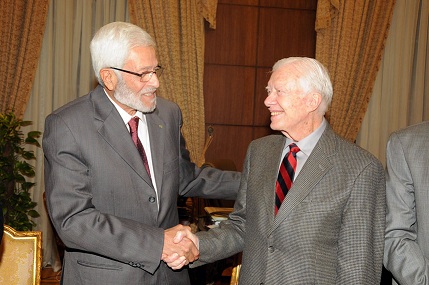By Islam Serour
Power saving measures will become mandatory by 2013, Prime Minister Hesham Qandil told a press conference Friday night, noting that the government will issue the organising criteria and conditions.
The Prime Minister relayed the findings of the technical committee tasked to investigate the rolling blackouts. According to which, electricity production covers 90 percent of domestic demand, while demand increased by 12 percent, leading to a 10 percent deficit. The increase in electricity demands didn’t meet an equivalent level of economic growth, according to the report. During the first half of 2012, growth plummeted to one percent, compared to six percent during the same period in 2011.
Qandil cited overconsumption in houses and shops as the main reason for power blackouts, urging citizens and shop owners to pursue power saving and consumption rationalisation. Overconsumption and the luxury of running more than one air conditioning unit is pressuring power stations he said, leading to power cuts.
“The luxury of running six or seven air conditioning units in houses should not be at the expense of industries and the lower classes,” Mr Qandil stated. He also stressed that “rationalising energy consumption is indispensible during this critical phase the country is facing.”
The Government’s plan for the coming weeks, according to the Prime Minister, has three objectives: ensuring that the implementation of selective power cuts is distributed fairly across all neighbourhoods as well asthe establishment of a hotline to receive citizens’ complains; guaranteeing uninterrupted supply of diesel to power plants; and launching a public relations campaign to promote power saving.
Deteriorating security conditions have also had a severe impact on the energy sector. ON TV Live reported yesterday that police stopped a car loaded with ten tonnes of stolen high-pressure cables in Aswan.
“The energy sector suffers greatly from the deteriorating security situation,” Qandil said. He explained that illegal constructions in the countryside are responsible for the theft of high pressure cable. According to some reports, the losses incurred by the Government as a result of citizens syphoning electricity amounted to EGP 400million.
Qandil denied any connection between exporting electricity to Gaza and the power shortages currently squeezing the country. He stated that electricity exports to Gaza are less than 0.008 percent of Egypt’s daily production, and the cost of electricity exported is covered by the Arab League. Qandil also noted the government has suspended all gas export operations except for exporting the minimum quantity to Jordon required to keep the Egypt-Jordan supply line functional.
Qandil concluded his talk on the energy crisis by stating that the government aims to increase energy production by 140 percent in order to overcome the current crisis.




